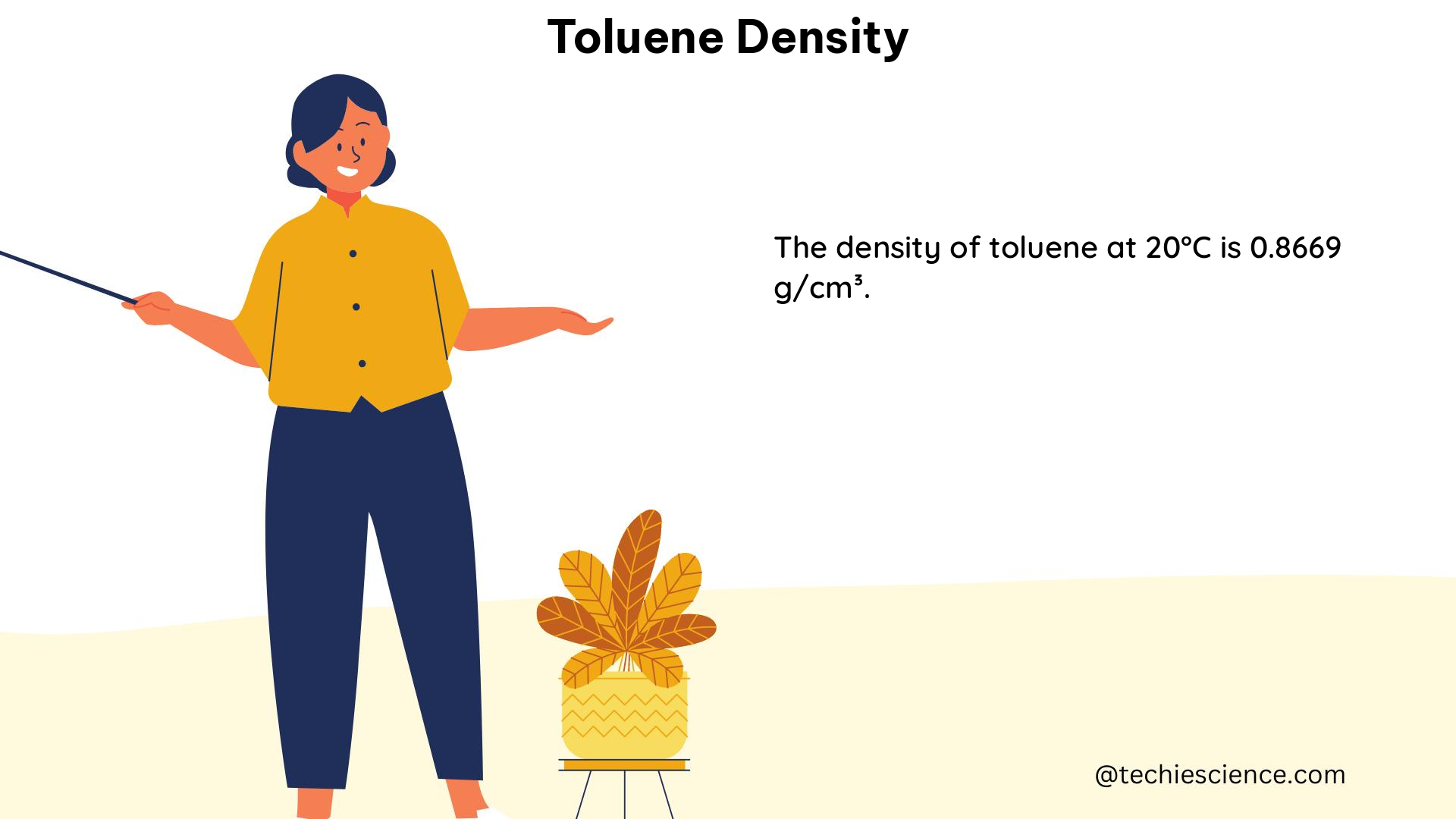Toluene, a colorless liquid with a sweet, strong odor, is a vital parameter in various industrial processes. Its density, which is 865 kg/m³ at ambient conditions, makes it well-suited for numerous applications, including use as a solvent, in aviation gasoline, and in the production of chemicals, perfumes, medicines, dyes, explosives, and detergents. Toluene’s freezing point of -95°C and boiling point of 111°C cover a wide range of industrial processes.
Understanding Toluene Density
Toluene has a low surface tension compared to water and is relatively inexpensive, making it a popular choice in many industries. The National Institute of Standards and Technology (NIST) has sold a density Standard Reference Material (SRM®) based on toluene for many years, but the previous SRM was certified only at ambient conditions: 15°C to 25°C and normal atmospheric pressure.
To address this limitation, a study by the NIST established the density of toluene as a function of temperature and pressure for use as a calibration standard. The measured density data were presented, and the density data were also represented in terms of an empirical function relating temperature, pressure, and density.
Empirical Function for Toluene Density
The empirical function relating the density of toluene to temperature and pressure is given by the following equation:
ρ = 0.8668 – 0.0007(T – 20) – 0.000004(P – 0.1)
Where:
– ρ is the density of toluene in g/mL
– T is the temperature in °C
– P is the pressure in MPa
This equation is valid for the following ranges:
– Temperature: 0°C to 50°C
– Pressure: 0.1 MPa to 50 MPa
Experimental Validation of Toluene Density
The density of toluene was measured using an absolute fluid densimeter at 20°C, and the value obtained was 0.8668 g/mL. Additionally, a quantitative analysis by gas chromatography with a flame ionization detector yielded an overall purity of 99.92% toluene with a standard uncertainty of 0.01.
The uncertainties for the density values were obtained through a thorough statistical analysis of multiple sources of uncertainty. This process considered the dependencies of the measured quantity on other underlying measurands, ensuring that the uncertainties at each level were properly accounted for. The measurements reported are directly traceable to SI quantities.
Toluene Density Data and Applications

The density of toluene is a well-studied and vital parameter in various industrial processes. To provide a comprehensive understanding, let’s explore some additional data points and applications:
Toluene Density at Different Temperatures and Pressures
| Temperature (°C) | Pressure (MPa) | Density (g/mL) |
|---|---|---|
| 0 | 0.1 | 0.8742 |
| 10 | 0.1 | 0.8705 |
| 20 | 0.1 | 0.8668 |
| 30 | 0.1 | 0.8631 |
| 40 | 0.1 | 0.8594 |
| 50 | 0.1 | 0.8557 |
| 20 | 10 | 0.8672 |
| 20 | 20 | 0.8676 |
| 20 | 30 | 0.8680 |
| 20 | 40 | 0.8684 |
| 20 | 50 | 0.8688 |
Applications of Toluene Density
-
Solvent Applications: Toluene’s density and low surface tension make it an effective solvent for various applications, such as in the production of paints, inks, adhesives, and cleaning agents.
-
Fuel Additive: Toluene is used as a high-octane additive in aviation gasoline, improving the fuel’s performance and combustion characteristics.
-
Chemical Synthesis: The density of toluene is crucial in the production of various chemicals, including benzene, xylene, and a wide range of organic compounds used in the pharmaceutical, dye, and explosive industries.
-
Calibration Standard: The NIST’s establishment of toluene density as a function of temperature and pressure has made it a valuable calibration standard for various measurement instruments and processes.
-
Environmental Monitoring: Toluene’s density and other physical properties are important in the monitoring and remediation of environmental contamination, as it is a common pollutant in soil and groundwater.
-
Research and Development: The detailed understanding of toluene density is essential for researchers and engineers working on projects involving phase equilibria, thermodynamic properties, and transport phenomena in various industries.
Conclusion
The density of toluene is a well-studied and vital parameter in numerous industrial processes. Its density of 865 kg/m³ at ambient conditions, low surface tension, and relatively low cost make it a popular choice in a wide range of applications, from solvents and fuels to chemical synthesis and calibration standards.
The NIST’s comprehensive study on the density of toluene as a function of temperature and pressure has provided a valuable empirical function and data set for use as a calibration standard. The detailed understanding of toluene density, including its experimental validation and uncertainty analysis, is crucial for researchers, engineers, and industry professionals working in fields that rely on the accurate characterization of this important substance.
References
- Toluene Fact Sheet
- Toluene Safety Data Sheet
- Density of Toluene as a Function of Temperature and Pressure
- Toluene Toxicological Profile

The lambdageeks.com Core SME Team is a group of experienced subject matter experts from diverse scientific and technical fields including Physics, Chemistry, Technology,Electronics & Electrical Engineering, Automotive, Mechanical Engineering. Our team collaborates to create high-quality, well-researched articles on a wide range of science and technology topics for the lambdageeks.com website.
All Our Senior SME are having more than 7 Years of experience in the respective fields . They are either Working Industry Professionals or assocaited With different Universities. Refer Our Authors Page to get to know About our Core SMEs.